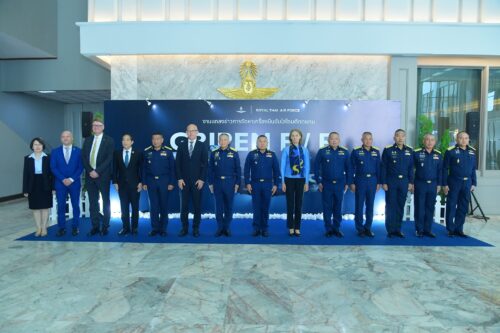The Royal Thai Air Force confirmed on Jun. 4, its selection of the Saab Gripen E/F as its new multi-role fighter aircraft, following a comprehensive evaluation process. The decision addresses Thailand’s requirement for 12 replacement fighter aircraft to modernize its F-16 aging fleet. Saab and the Swedish Defence Materiel Administration will now proceed with the next steps in the procurement process, though no contract has yet been signed.

Photo: RTAF
The procurement agreement extends beyond the aircraft acquisition to include a substantial offset package comprising 14 separate initiatives designed to benefit Thailand’s national security and strategic independence while bringing new jobs and investments across multiple sectors of Thai society. Saab has structured the offset program into seven direct and seven indirect components, each targeting specific capabilities and industrial sectors, though final details are still being determined.
Under the direct offset arrangements, Saab will establish a research and development office in Thailand and transfer intellectual property rights for the Link-T tactical data link system to the Royal Thai Air Force. The company will provide unrestricted use and expansion capabilities for the tactical data link, while simultaneously transferring Link-T development capabilities to both the air force and local defense industry partners.
The agreement enables Thai companies to participate in the global Gripen E/F supply chain, with opportunities spanning components such as tires, bearings, clamps, and airframe parts. Additionally, Saab will establish a maintenance, repair, and overhaul center at Wing 1 in Nakhon Ratchasima, creating a regional hub for Gripen E/F support operations while enhancing national repair capabilities and generating employment opportunities.
A significant component of the direct offset involves upgrades to Thailand’s existing Saab 340 airborne early warning aircraft. The complete system upgrade, typically valued at approximately $146 million, will be provided without additional charge as part of the offset agreement. The upgrade package includes expanded Thai participation in the AEW program and represents a substantial value addition to the overall procurement. After the upgrade, the Saab 340 will have airborne control capability with the addition of console stations inside the aircraft.
The indirect offset components focus on broader industrial and educational development initiatives. Saab will facilitate foreign direct investment across multiple Thai industrial sectors, with particular emphasis on job creation and technology transfer. An innovation center will serve as a hub for academic collaboration and research activities, applying what the company terms a “Triple Helix model” to generate additional skills and economic growth.
Educational cooperation forms a cornerstone of the indirect offset program. Saab will provide 50 scholarships for Thai students pursuing studies in Sweden, supporting joint research initiatives between Thai and Swedish universities. The program extends to vocational training and language proficiency development, with additional support from the British Council for educational partnership programs.
The offset package addresses emerging defense requirements through cyber technology initiatives. These include the establishment of cyber range facilities, cyber operations capabilities, and expert training programs to enhance Thailand’s defensive cyber capabilities.
Agricultural and forestry technology development represents another indirect offset component, with new projects designed to improve quality and competitiveness in food production, agriculture, and forestry industries. The program aims to create sustainable improvements in these sectors through technology transfer and capacity building.
The procurement follows established defense offset methodologies and includes risk management assessments to ensure program synchronization and successful implementation. The agreement spans a 10-year implementation period, allowing for phased delivery of both aircraft and offset commitments.
Thailand’s selection of the Gripen E/F continues the country’s relationship with Swedish defense technology, building upon its existing operation of Gripen C/D aircraft since 2011. The comprehensive offset package reflects modern defense procurement practices that extend beyond equipment acquisition to encompass broader industrial cooperation and technology transfer agreements.
“We welcome the Royal Thai Air Force’s selection of Gripen E/F as its future fighter and look forward to the next steps in this procurement process. Gripen E/F is the best solution to provide Thailand with independent airpower for the future which will contribute significantly to the nation’s safety and security,” said Micael Johansson, President and CEO of Saab.
The agreement positions Thailand to develop indigenous defense capabilities while participating in global defense supply chains, representing a significant step in the country’s defense industrial development strategy. Implementation of the offset program will be monitored through established defense cooperation mechanisms between Thailand and Sweden.